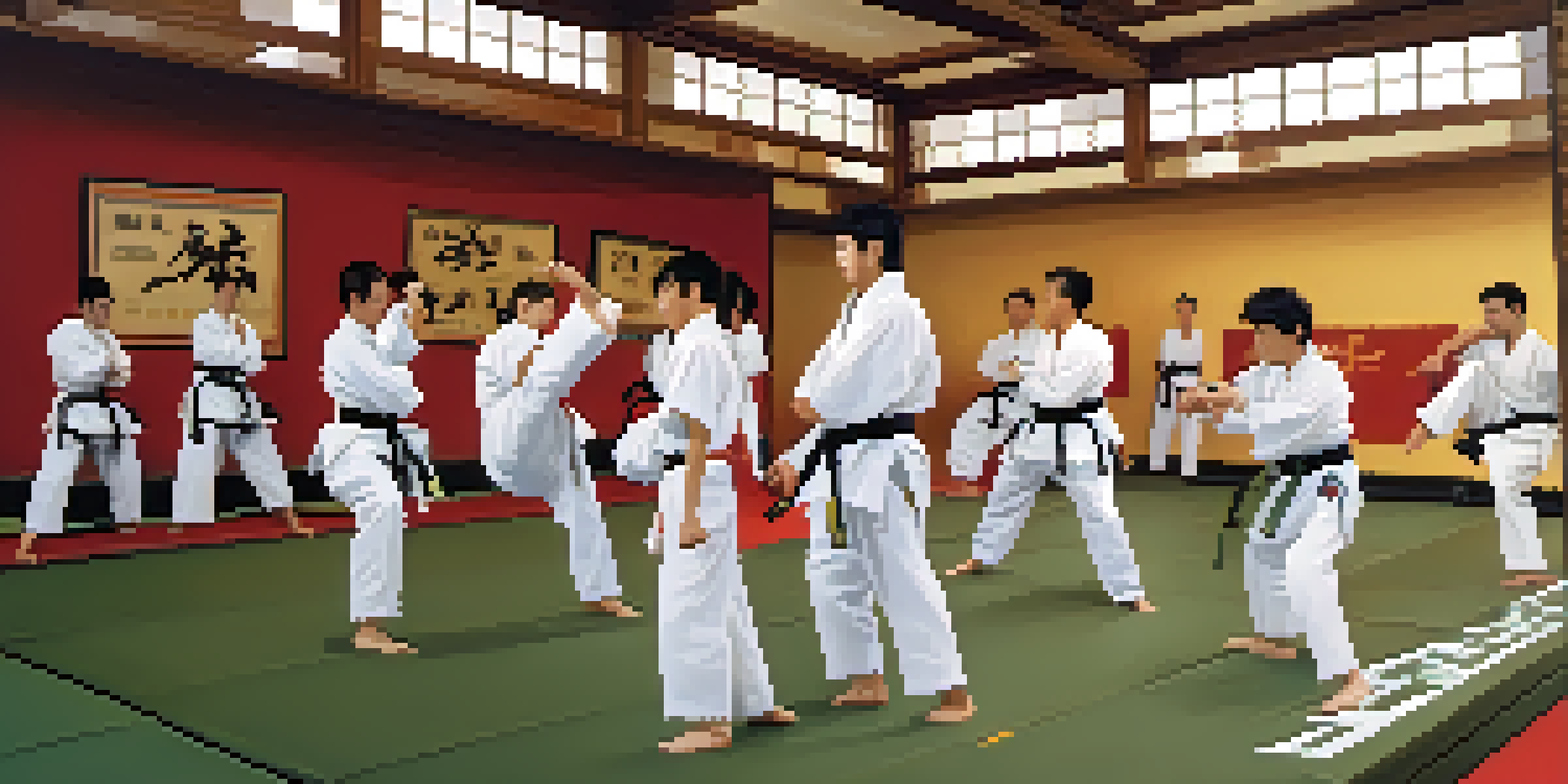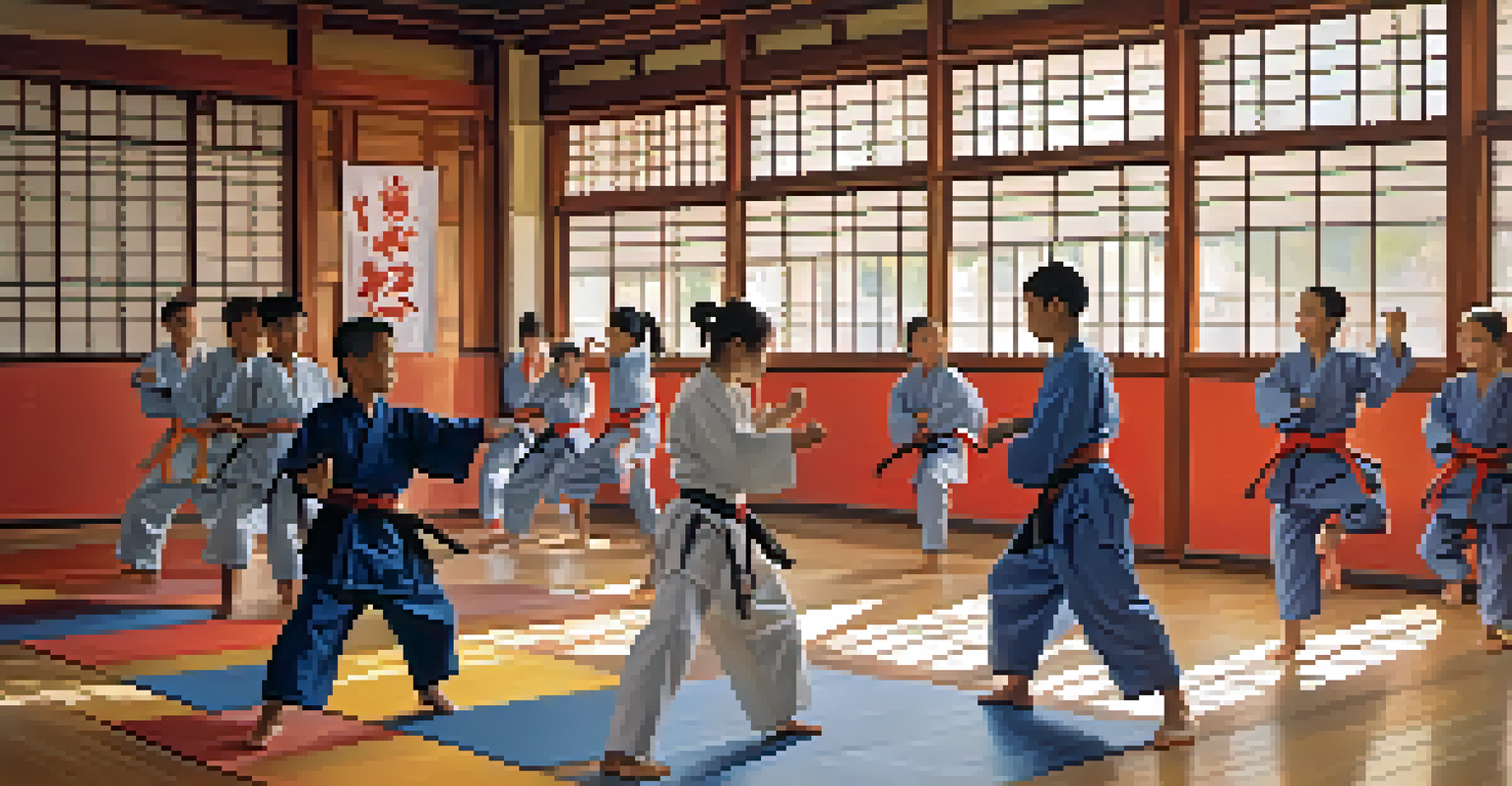The Impact of Martial Arts Training on Cardiovascular Health

Introduction to Martial Arts and Cardiovascular Health
Martial arts encompass various disciplines that combine physical activity, mental focus, and self-discipline. These practices not only teach self-defense but also promote overall health, particularly cardiovascular fitness. As we delve into the connection between martial arts and heart health, it’s essential to understand how these activities elevate heart rates and improve endurance.
The body achieves what the mind believes.
Engaging in martial arts means you're constantly moving, whether it's through sparring, practicing forms, or conditioning exercises. This continuous motion elevates your heart rate, which is a key factor in cardiovascular training. It’s similar to how running or cycling works, but with the added benefits of coordination and agility.
Moreover, martial arts training can be tailored to suit different fitness levels, making it accessible to nearly anyone. Whether you're a seasoned practitioner or a complete beginner, there's always a way to enhance your cardiovascular health through martial arts.
How Martial Arts Training Elevates Heart Rate
One of the most significant benefits of martial arts is its ability to raise your heart rate during training sessions. Activities like kicking, punching, and footwork require explosive movements that get your blood pumping. Think of it like interval training; you're alternating between high-intensity bursts and lower-intensity recovery phases.

As your heart rate increases, your body begins to adapt, improving your cardiovascular endurance over time. This adaptation is crucial for reducing the risk of heart disease and other related conditions. Just like any good workout, consistency is key to reaping these benefits.
Boost Heart Health with Martial Arts
Martial arts training elevates heart rates and improves cardiovascular endurance through dynamic movements and consistent practice.
Incorporating martial arts into your routine can also make exercising more enjoyable. Instead of dreading a monotonous cardio session, you get to learn new skills and techniques while working your heart, making it easier to stay committed.
The Role of Strength and Flexibility in Heart Health
While cardiovascular exercise is vital, martial arts also emphasizes strength and flexibility, which play a significant role in overall heart health. Stronger muscles require less effort from your heart to perform the same tasks, enhancing your overall efficiency. This is akin to a well-tuned car that runs smoothly with less energy.
Martial arts is not about fighting; it’s about building a better you.
Flexibility is another critical component, as it can prevent injuries and promote better blood flow throughout the body. With improved flexibility, movements become smoother and more controlled, which can further enhance your workout efficiency and cardiovascular performance.
Therefore, martial arts provide a comprehensive approach to fitness that strengthens the heart, builds muscle, and enhances flexibility. This holistic method ultimately leads to a healthier body and greater physical resilience.
Mental Benefits of Martial Arts on Heart Health
Martial arts training isn't just a physical endeavor; it also offers profound mental benefits that can influence your heart health. The focus required during practice can lead to reduced stress levels, which is crucial since stress is known to negatively impact cardiovascular health. Think of martial arts as a form of moving meditation, helping you cultivate mindfulness while you train.
Additionally, the discipline learned through martial arts can foster healthier lifestyle choices outside the dojo. Practitioners often become more aware of their nutrition and habits, striving for a balanced lifestyle that supports their training. This holistic approach can significantly improve heart health over time.
Mental Focus Reduces Stress
The discipline and mindfulness cultivated in martial arts can lead to reduced stress levels, positively impacting heart health.
So, while you're working on those punches and kicks, you're also giving your heart a mental workout. The connection between mind and body in martial arts can lead to a more balanced, healthier life.
Community and Support in Martial Arts Training
Another remarkable feature of martial arts is the sense of community and support it fosters. Training in a group setting not only makes workouts more enjoyable but also motivates individuals to stay consistent. When you're surrounded by others who share similar goals, you're more likely to push yourself and stick with your training.
The camaraderie built in martial arts classes can also contribute to emotional well-being, which is intrinsically linked to heart health. A strong support system helps combat feelings of isolation and depression, both of which can have adverse effects on cardiovascular health.
Ultimately, martial arts create an environment where individuals encourage one another, making it easier to commit to regular training and maintain a healthy heart.
Injury Prevention Through Martial Arts Training
Martial arts training includes techniques that enhance balance, coordination, and body awareness, all essential for injury prevention. A strong understanding of your body can help you avoid accidents, both on and off the mat. This reduced risk of injury means you can maintain a consistent exercise routine, which is crucial for heart health.
Additionally, many martial arts incorporate warm-up and cool-down routines that prepare the body for intense activity and promote recovery afterward. These practices can help protect your muscles and joints, allowing you to focus on your cardiovascular training without the fear of setbacks.
Community Support Enhances Commitment
Training in a supportive group environment fosters motivation and emotional well-being, which are crucial for maintaining a healthy heart.
By prioritizing injury prevention, martial arts practitioners can enjoy longer training sessions, which directly contributes to better cardiovascular health over time.
Conclusion: The Lifelong Benefits of Martial Arts Training
In conclusion, martial arts training offers a plethora of benefits for cardiovascular health, from elevating heart rates to enhancing strength and flexibility. The mental and community aspects of training further enrich the experience, making it a holistic approach to fitness. Whether you're looking to improve your heart health or simply want to learn a new skill, martial arts can be a rewarding choice.
As you embark on your martial arts journey, remember that the key to success lies in consistency and enjoyment. The more you engage with the practice, the more benefits you will reap, not just for your heart but for your entire well-being.

So, lace up those gloves and step onto the mat—your heart will thank you for it!